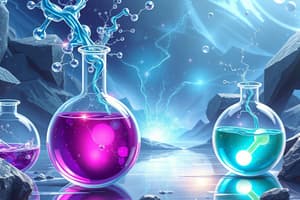Podcast
Questions and Answers
Which of the following compounds is classified as a strong electrolyte?
Which of the following compounds is classified as a strong electrolyte?
- Sodium chloride (correct)
- Glucose
- Ammonium hydroxide
- Acetic acid
What distinguishes weak electrolytes from strong electrolytes?
What distinguishes weak electrolytes from strong electrolytes?
- Weak electrolytes produce no ions in solution.
- Weak electrolytes only partially dissociate in solution. (correct)
- Weak electrolytes are nonpolar substances.
- Weak electrolytes completely dissociate in solution.
Which of the following is a nonelectrolyte?
Which of the following is a nonelectrolyte?
- Lithium nitrate
- Calcium sulfate
- Potassium bromide
- Ethanol (correct)
Which category does hydrochloric acid fall into?
Which category does hydrochloric acid fall into?
When comparing strong electrolytes to weak electrolytes, strong electrolytes have:
When comparing strong electrolytes to weak electrolytes, strong electrolytes have:
What type of reaction occurs when an acid reacts with a carbonate?
What type of reaction occurs when an acid reacts with a carbonate?
Which of the following correctly represents a neutralization reaction?
Which of the following correctly represents a neutralization reaction?
What products are formed in a gas-forming neutralization reaction involving sulfuric acid and sodium bicarbonate?
What products are formed in a gas-forming neutralization reaction involving sulfuric acid and sodium bicarbonate?
Which of the following is an example of a gas-forming reaction involving an acid and a sulfite compound?
Which of the following is an example of a gas-forming reaction involving an acid and a sulfite compound?
Which of the following statements about acid-base neutralization reactions is true?
Which of the following statements about acid-base neutralization reactions is true?
Flashcards are hidden until you start studying
Study Notes
Strong Electrolytes
- Dissociate completely into ions when dissolved in water
- Conduct electricity efficiently
Weak Electrolytes
- Partially dissociate into ions when dissolved in water
- Conduct electricity poorly
Nonelectrolytes
- Do not dissociate into ions when dissolved in water
- Do not conduct electricity
Hydrochloric Acid
- Strong electrolyte
Strong vs Weak Electrolytes
- Strong electrolytes have a higher degree of ionization than weak electrolytes
- Strong electrolytes produce more ions in solution, leading to higher electrical conductivity
Strong Electrolytes
- Strong electrolytes dissociate completely into ions when dissolved in water, resulting in a high conductivity of the solution.
Weak Electrolytes
- They only partially dissociate into ions in solution, resulting in a lower conductivity.
Nonelectrolytes
- These compounds do not dissociate into ions when dissolved in water, meaning they do not conduct electricity.
Hydrochloric Acid
- It's a strong acid, which means it is a strong electrolyte and dissociates completely in solution, forming hydrogen and chloride ions.
Strong Electrolytes vs. Weak Electrolytes
- Strong electrolytes dissociate completely into ions in solution, while weak electrolytes only partially dissociate.
Acid-Carbonate Reaction
- When an acid reacts with a carbonate, it produces carbon dioxide gas, water, and a salt.
Neutralization Reaction
- This occurs when an acid reacts with a base, and the products are salt and water.
Gas-Forming Neutralization Reaction Products
- The reaction between sulfuric acid and sodium bicarbonate produces sodium sulfate, water, and carbon dioxide gas.
Gas-Forming Reaction with Sulfite Compound
- An example of this type of reaction is between hydrochloric acid and sodium sulfite, producing sodium chloride, water, and sulfur dioxide gas.
Acid-Base Neutralization Reaction
- These reactions always result in the formation of a salt and water, where the salt is formed from the cation of the base and the anion of the acid.
Studying That Suits You
Use AI to generate personalized quizzes and flashcards to suit your learning preferences.




